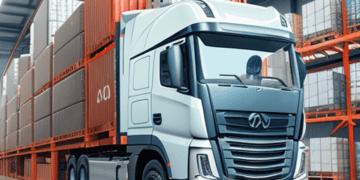The logistics sector, traditionally characterized by manual operations and conventional workflows, is witnessing a significant transformation propelled by advancements in Artificial Intelligence (AI). This evolution is marked by the integration of sophisticated algorithms and data analytics, which are redefining the efficiency and dynamism of supply chains globally.
AI technologies are at the forefront of this shift, offering innovative solutions to automate complex processes, enhance decision-making, and elevate customer satisfaction. The applications of AI in logistics range from predictive analytics for demand forecasting to intelligent systems for route optimization, maintenance scheduling, and automated warehouse management. These advancements not only streamline operations but also contribute to substantial cost reductions and service improvements.
The adoption of AI in the logistics industry has been fueled by its capacity to manage and analyze large volumes of data, enabling businesses to anticipate market demands, optimize resource allocation, and deliver services more efficiently. According to industry forecasts, the logistics sector’s investment in AI is expected to experience exponential growth, with projections indicating a market value of $738.80 billion by 2030. This rapid expansion underscores the technology’s transformative potential and its role in enhancing the competitiveness and agility of supply chain operations.
AI’s contribution to logistics is multifaceted, offering tools for seamless automation of repetitive tasks, insightful analysis for strategic planning, and predictive models for proactive management. These capabilities facilitate a more responsive and adaptive logistics framework, capable of addressing the dynamic needs of the global market.
However, the integration of AI into logistics is not without its challenges. Companies face hurdles such as the high costs associated with implementing AI technologies, the need for specialized skills to manage and interpret AI-driven data, and concerns regarding data privacy and cybersecurity. These obstacles necessitate careful consideration and strategic planning to ensure successful adoption and maximization of AI’s benefits.
Despite these challenges, the potential of AI to revolutionize logistics operations remains undeniable. From enhancing route efficiency to improving warehouse operations and beyond, AI-driven technologies are setting new standards for the industry. As companies continue to explore and invest in AI solutions, the logistics sector is poised for unprecedented innovation and growth.
The exploration of AI’s role in logistics further highlights its capacity to address longstanding industry challenges, such as demand variability, inventory management, and last-mile delivery complexities. By harnessing AI’s predictive analytics, companies can achieve more accurate demand forecasting, leading to optimized inventory levels and reduced waste. This precision not only enhances operational efficiency but also contributes to more sustainable supply chain practices.
AI-driven solutions like autonomous vehicles and drones are redefining last-mile delivery, offering faster and more cost-effective alternatives to traditional delivery methods. These innovations are particularly relevant in urban logistics, where efficiency and speed are paramount. By automating delivery processes, companies can ensure timely deliveries while minimizing environmental impact, aligning with the growing emphasis on green supply chains.
The role of AI in improving warehouse operations cannot be overstated. Advanced robotics and machine learning algorithms are being employed to automate picking and packing processes, significantly increasing the speed and accuracy of warehouse operations. This automation not only boosts productivity but also enhances worker safety by reducing the need for manual labor in hazardous environments.
In facing the challenges of AI adoption, it is crucial for companies to invest in the development of digital skills within their workforce. This involves providing training and resources to equip employees with the necessary knowledge to work alongside AI technologies effectively. Additionally, addressing cybersecurity concerns is essential to protect sensitive data and maintain trust in AI systems. Companies must implement robust security measures and adopt best practices to mitigate risks associated with digital transformation.
As the logistics industry navigates the complexities of AI integration, collaboration between technology providers, industry stakeholders, and regulatory bodies will be key to unlocking the full potential of AI. By fostering an ecosystem that supports innovation and addresses ethical and operational challenges, the logistics sector can move towards a more efficient, sustainable, and resilient future.
As we delve deeper into the intersection of AI and logistics, it’s important to consider the broader implications for global trade and economic growth. AI’s ability to streamline supply chain operations has the potential to significantly reduce costs and improve efficiency, thereby enhancing the competitiveness of businesses on a global scale. This technological leap could lead to more resilient supply chains, capable of adapting to disruptions and fluctuations in the global market more effectively.
One of the most promising aspects of AI in logistics is its potential to foster sustainability. By optimizing routes and improving inventory management, AI can help reduce carbon emissions and waste, contributing to the development of green supply chains. This is particularly relevant in the context of growing environmental concerns and the push for corporate social responsibility. Companies that leverage AI to enhance their sustainability efforts not only contribute to environmental protection but also appeal to increasingly eco-conscious consumers.
Moreover, the integration of AI into logistics opens up new opportunities for innovation and service enhancement. For instance, AI-enabled platforms can provide real-time tracking and predictive analytics, offering unparalleled transparency and reliability to customers. This level of service not only improves customer satisfaction but also drives loyalty and competitive advantage in the market.
However, the successful implementation of AI in logistics requires a supportive regulatory framework that addresses concerns around data privacy, cybersecurity, and ethical use of AI. Policymakers play a crucial role in creating an environment that encourages innovation while safeguarding against potential risks. By establishing clear guidelines and standards for AI applications, governments can help ensure that the benefits of AI are realized across the supply chain sector.
The journey of integrating AI into logistics is an ongoing process that offers immense potential for transforming the supply chain industry. As businesses and technology providers continue to explore new applications and solutions, the importance of collaboration, regulatory support, and ethical considerations becomes increasingly evident. The future of logistics lies in harnessing the power of AI to create more efficient, sustainable, and resilient supply chains.















